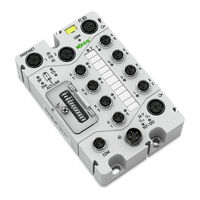WAGO SPEEDWAY 767 Series Manuals
Manuals and User Guides for WAGO SPEEDWAY 767 Series. We have 10 WAGO SPEEDWAY 767 Series manuals available for free PDF download: Manual
WAGO SPEEDWAY 767 Series Manual (260 pages)
FC CANopen 8DI 24V DC CANopen Fieldbus Coupler
Table of Contents
-
-
Symbols10
-
Legal Bases13
-
Connectors24
-
Labeling30
-
Dimensions33
-
System Data34
-
Device Data34
-
Supply35
-
Inputs35
-
Diagnostics36
-
Indicators37
-
Isolation37
-
Approvals38
-
Mounting40
-
Notes51
-
Process Data70
-
EDS Files71
-
PDO Mapping73
-
Diagnostics89
-
Operational98
-
Stopped98
-
Examples of Sdos109
-
Node Guarding111
-
SYNC Monitoring114
-
Stop Remote Node116
-
Reset Node117
-
Bootup Protocol119
-
Diagnostics120
-
LED Signaling120
-
Parameterizing140
-
Service Page158
-
Life List160
-
System Update162
-
Parameterization172
-
Service186
-
Disposal188
-
Accessories194
-
Appendix204
-
Parameter220
Advertisement
WAGO SPEEDWAY 767 Series Manual (220 pages)
PROFINET IO Fielbus Coupler For WAGO-SPEEDWAY 767
Brand: WAGO
|
Category: Control Unit
|
Size: 9 MB
Table of Contents
-
-
-
Connectors23
-
Labeling29
-
Dimensions32
-
Device Data33
-
System Data33
-
Supply34
-
Inputs34
-
Diagnostics35
-
Indicators35
-
Isolation36
-
Approvals37
-
-
5 Mounting
39 -
-
Notes50
-
-
-
TCP/IP" View71
-
Port" View71
-
SNMP" View72
-
Clock" View74
-
Users" View74
-
-
-
14 Diagnostics
130-
LED Signaling130
-
-
-
Service Page164
-
User Management165
-
File System166
-
Life List168
-
System Update170
-
Parameterization186
-
16 Service
197-
Disposal199
-
-
18 Accessories
205
WAGO SPEEDWAY 767 Series Manual (102 pages)
Digital Input/Output Module 24 V DC / 0.5 A For WAGO-SPEEDWAY 767
Brand: WAGO
|
Category: Control Unit
|
Size: 5 MB
Table of Contents
-
Deutsch
5-
Symbols7
-
Legal Bases10
-
Connectors17
-
Labeling20
-
Dimensions23
-
Supply24
-
Inputs25
-
Outputs26
-
Diagnostics30
-
Isolation30
-
Indicators30
-
Approvals31
-
Mounting33
-
Notes44
-
DO Mode68
-
Input Data68
-
Output Data69
-
DI Mode70
-
Input Data70
-
Output Data71
-
DIO Mode72
-
Input Data72
-
Output Data73
-
Input Data74
-
Output Data75
-
Input Data77
-
Output Data78
-
Control Byte82
-
Status Byte83
-
Diagnostics85
-
Service88
-
Disposal90
-
Appendix98
Advertisement
WAGO SPEEDWAY 767 Series Manual (102 pages)
8DIO 24V DC 0.5A IF (8xM12) Digital Input/Output Module 24 V DC / 0.5 A
Brand: WAGO
|
Category: Control Unit
|
Size: 5 MB
Table of Contents
-
Deutsch
5-
Symbols7
-
Legal Bases10
-
Connectors17
-
Labeling20
-
Dimensions23
-
Supply24
-
Inputs25
-
Outputs26
-
Diagnostics30
-
Isolation30
-
Indicators30
-
Approvals31
-
Mounting33
-
Notes44
-
DO Mode68
-
Input Data68
-
Output Data69
-
DI Mode70
-
Input Data70
-
Output Data71
-
DIO Mode72
-
Input Data72
-
Output Data73
-
Input Data74
-
Output Data75
-
Input Data77
-
Output Data78
-
Control Byte82
-
Status Byte83
-
Diagnostics85
-
Service88
-
Disposal90
-
Appendix98
WAGO SPEEDWAY 767 Series Manual (96 pages)
Serial Interface (RS-232, RS-422/-485) 2 interfaces (2xM12) + 4 digital inputs/outputs (2xM12, two inputs/outputs per connector)
Brand: WAGO
|
Category: Recording Equipment
|
Size: 4 MB
Table of Contents
-
-
-
Connectors17
-
Labeling20
-
Dimensions23
-
Device Data24
-
Supply24
-
Diagnostics27
-
Indicators28
-
Isolation28
-
Approvals29
-
-
4 Mounting
31 -
-
Notes42
-
-
-
11 Service
80-
Disposal82
-
12 Appendix
83-
Message84
WAGO SPEEDWAY 767 Series Manual (94 pages)
4DIO 24V DC 0.2A HS (4xM12) Digital In/Out Module, 24 V DC, 0.2 A, High Speed For WAGO-SPEEDWAY 767
Brand: WAGO
|
Category: Control Unit
|
Size: 4 MB
Table of Contents
-
Deutsch
3-
Symbols7
-
Legal Bases10
-
Connectors16
-
Labeling19
-
Dimensions22
-
General Data23
-
Diagnostics26
-
Isolation26
-
Indicators27
-
Approvals28
-
Mounting30
-
Notes41
-
Input Data65
-
Output Data66
-
Input Data67
-
Output Data68
-
Input Data69
-
Output Data70
-
Input Data71
-
Output Data72
-
Control Byte75
-
Status Byte76
-
Diagnostics78
-
Service81
-
Disposal83
-
Appendix89
WAGO SPEEDWAY 767 Series Manual (80 pages)
Digital Output Module 24 V DC / 0.5 A
Brand: WAGO
|
Category: Control Unit
|
Size: 5 MB
Table of Contents
-
Deutsch
3-
Symbols7
-
Legal Bases10
-
Connectors16
-
Labeling19
-
Dimensions22
-
Supply23
-
Outputs24
-
Isolation26
-
Diagnostics26
-
Approvals27
-
Mounting29
-
Notes40
-
Output Data59
-
Input Data61
-
Diagnostics63
-
Service66
-
Disposal68
-
Appendix76
WAGO SPEEDWAY 767 Series Manual (80 pages)
8DO 24V DC 2.0A IF (4xM12) Digital Output Module 24 V DC / 2.0 A
Brand: WAGO
|
Category: Control Unit
|
Size: 5 MB
Table of Contents
-
Deutsch
3-
Symbols7
-
Legal Bases10
-
Connectors16
-
Labeling19
-
Dimensions22
-
Supply23
-
Outputs24
-
Isolation26
-
Diagnostics26
-
Approvals27
-
Mounting29
-
Notes40
-
Output Data59
-
Input Data61
-
Diagnostics63
-
Service66
-
Disposal68
-
Appendix76
WAGO SPEEDWAY 767 Series Manual (80 pages)
8DO 24V DC 2.0A IF (8xM8), Digital Output Module 24 V DC / 2.0 A for WAGO-SPEEDWAY 767
Brand: WAGO
|
Category: Control Unit
|
Size: 4 MB
Table of Contents
-
-
-
Connectors16
-
Labeling19
-
Dimensions22
-
Supply23
-
Outputs24
-
Diagnostics26
-
Isolation26
-
Approvals27
-
-
4 Mounting
29 -
-
Notes40
-
-
-
10 Service
66-
Disposal68
-
-
12 Appendix
76
WAGO SPEEDWAY 767 Series Manual (78 pages)
8DO 24V DC 0.5A IF (8xM8) Digital Output Module 24 V DC / 0.5 A For WAGO-SPEEDWAY 767
Brand: WAGO
|
Category: Control Unit
|
Size: 4 MB
Table of Contents
-
Symbols6
-
Connectors15
-
Labeling18
-
Dimensions21
-
Supply22
-
Outputs23
-
Diagnostics25
Advertisement









